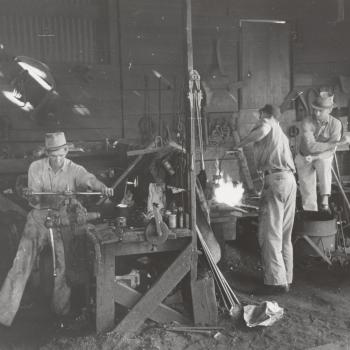Pope Leo XIII and Controversy in the United States by Bill Droel
Our new Pope Leo XIV chose his papal name to pair his interest in our high-tech economy with Pope Leo XIII’s (1810-1903) interest in the industrial revolution. Today’s social questions, particularly “developments in the field of artificial intelligence pose new challenges for the defense of human dignity, justice and labor,” says Chicago-born Leo XIV.
In his 1891 encyclical, On the Condition of Labor, Leo XIII famously endorsed labor unions as one bulwark against the harshness of industrial capitalism. To do so, however, Leo XIII had to clarify his thinking and put aside an opinion about the Noble Order of the Knights of Labor.
Founded in 1869, the Knights of Labor was a large movement in the U.S. It was quite decentralized, with many chapters throughout the country. It also counted a few chapters in Canada and Great Britian. The Knights of Labor rarely achieved labor relations contracts. More often its job actions resulted in an isolated pay raise or a safety improvement. It was better known for campaigns, including support for an eight-hour workday and prohibitions on child labor. The Knights of Labor attracted Catholics, probably most of its members. Its longtime president, Terence Powderly (1849-1924), was Catholic.
The Vatican was long suspicious of secret societies. The fear was over plots of violence, of anti-Catholic indoctrination and of dark rituals. Catholic leaders in Europe favored fraternal groups and guilds over which there was a level of Catholic influence. In 1734 Catholicism formally prohibited membership in the Masons. In subsequent years, bishops penalized Catholics known to be Masons or members in other secret societies. For a time, the Knights of Labor used secrecy to help prevent employers from firing its members. Thus, Cardinal Eleazar Taschereau (1820-1898) of Quebec explicitly condemned the Knights of Labor in 1884. Five U.S. bishops were prepared to ban the movement in this country. Leo XIII considered joining them.
Cardinal James Gibbons (1834-1921), a bishop since age 34, knew the situation of working families. “The Savior…never conferred a greater temporal boon on [people] than by ennobling and sanctifying manual labor, and by rescuing it from the stigma of degradation which had been branded upon it,” Gibbons said. Christ “is the reputed son of an artisan, and his early manhood is spent in a mechanic’s shop… Every honest labor is laudable, thanks to the example and teaching of Christ.” Gibbons was not about to allow a condemnation of the Knights of Labor to stand. He met with Powderly and negotiated changes to the Knights of Labor, including dropping The Noble Order from its name. He then fashioned an argument in favor of the union, saying “It is the right of laboring classes to protect themselves, and the duty of the whole people to find a remedy against avarice, oppression, and corruption.”
In early 1887 Gibbons went to Rome and impressed upon Leo XIII the danger of losing working families to the faith if the pope were to condemn labor unions. Gibbons was persuasive. The pope blessed labor unions. Leo XIII said that unions and government intervention can be countervailing forces against the “misery and wretchedness” that industrial capitalism tends to press “unjustly on the majority of the working class.”
Gibbons’ effort on behalf of the Knights of Labor is considered the great achievement of his leadership in the U.S. To be continued…
Droel is editor at National Center for the Laity (PO Box 291102, Chicago, IL 60629), which distributes a new edition of Leo XIII’s On the Condition of Labor; $7.











